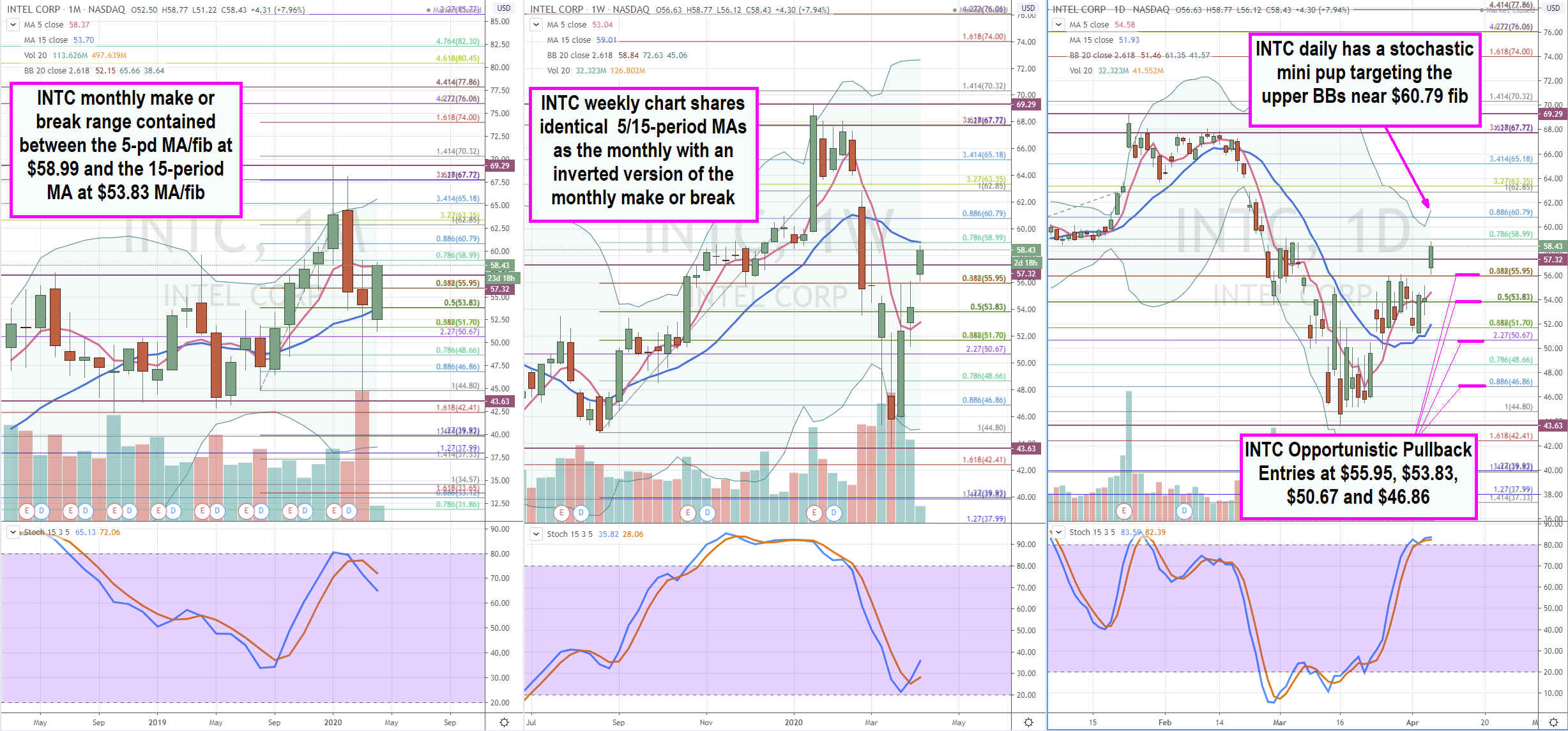Semiconductor giant
Intel Corporation (NASDAQ: INTC) shares made decade-long highs at $69.29 on Jan. 24, 2020, in reaction to its Q4 2019 EPS beat by + $0.27. Intel raised Q1 2020 EPS to $1.30 vs. $1.03 and FY 2020 EPS of $5.00 consensus analyst estimates of $4.65. Investors and analysts were blindsided by the growth in 19% year-over-year (YoY) growth in the Data Center Group segment. The robust demand was driven by cloud service provider customers underscoring the strength in data centers. The COVID-19 pandemic plunged shares by (-37%) to a low of $43.63 on March 16
th mirroring the (-35%) plunge in the
S&P 500 (NYSEARCA: SPY). Intel shares have since rebounded as investors come to the realization that global social distancing mandates should spike data center chip demand. Prudent investors and traders should monitor the opportunistic entry levels that should present themselves.
COVID-19 Bolsters Chip Demand
As entire nations, states and jurisdictions get put on lockdown, consumers need the hardware to engage in work-at-home productivity. School districts and universities implementing online classrooms require students to upgrade or purchase laptops and streaming equipment. Intel should see an unexpected spike in PCs, laptops and streaming accessories in addition to data-centric equipment. The overall industry should benefit from this surge in online activity including storage Micron Technologies (NYSE: MU) and Western Digital (NYSE: WDC) , gaming processor units (GPUs) NVidia (NASDAQ: NVDA) and Applied Micro Devices (NASDAQ: AMD) and mobile broadband chips Broadcom (NASDAQ: AVGO). Qualcomm (NASDAQ: QCOM) CEO, Steve Mollenkopf commented that the China handset demand fell off a cliff in February but quickly rebounded to year-ago levels in five-weeks. Whether Europe and the U.S. rebound as quickly remains to be seen, but China is the template.
Samsung Echoes Data Center Surge
On April 6th, diversified electronics conglomerate Samsung Electronics (OTCMKTS: SSNLF) reported strong Q1 2020 earnings underscored by big surge in server chip demand. These headwinds should apply to the rest of the chip makers. Social distancing mandates have bolstered remote and mobile activities like video conferencing, telework, online classrooms, streaming content and gaming. With half the world’s population self-isolation, the insatiable capacity demands from data centers should bolster Intel FY 2020 guidance. The spoiler would be disruption in OEM supply chains and the logistics of actually getting products to consumers. China has claimed that manufacturing capacity is quickly returning to normal levels. They also reported a significant milestone with no new COVID-19 deaths on April 6th.

Opportunistic Buy Levels
Using the rifle charts on wider time frames to lay out the playing field is suitable for swing traders and investors. INTC shares have had stronger than normal positive correlation with the SPY ETF up to April 6th, 2020. However, the recent recovery back to the monthly 5-period moving average (MA) at $58.99 Fibonacci (fib) level whereas the SPY is still 30-points away from its monthly 5-period MA implies that INTC shares may have gotten ahead of itself. Therefore, it’s prudent to await pullbacks to opportunistic entry levels rather than chase entries.
The monthly INTC “make or break” set-up on the rifle charts means there is a potential bullish pup MA breakout versus a bearish mini inverse pup stochastic breakdown. Like pinball table, prices oscillate between the 15-period MA and 5-period MA until a crossover to the upside for a breakout or downside for a breakdown. The weekly make or break is an inverted version where an inverse pup breakdown versus a stochastic mini pup breakout. The violent overshoots will ultimately result in a range tightening.
INTC has a double resistance level at the $58.99 fib composed of the monthly 5-period MA and weekly 15-period MA. If the daily high band stochastic mini pup triggers, the daily upper Bollinger Bands (BBs) near the $60.79 fib is the remaining target and likely reversal area. More than likely, INTC will form a reversion pullback after testing the $58.99 overlapping resistance. The nominal reversions would target the $53.83 fib area. If the make or break on either the monthly or weekly chart resolve, the next leg down would be the $50.67 and $46.86 fib levels. These are the four opportunistic entry levels: $55.95 market structure low (MSL)fib, $53.83 monthly 5-pd MA/weekly 15-period MA/fib, $50.67 sticky 5’s zone/fib and $46.86 fib. Nimble traders can scalp these levels initially for reversion and then with the intraday trend. Swing traders can scale for overnight to multi-day holds. Long-term investors may consider a dollar-cost averaging approach with income generation through writing covered calls.
Before you make your next trade, you'll want to hear this.
MarketBeat keeps track of Wall Street's top-rated and best performing research analysts and the stocks they recommend to their clients on a daily basis.
Our team has identified the five stocks that top analysts are quietly whispering to their clients to buy now before the broader market catches on... and none of the big name stocks were on the list.
They believe these five stocks are the five best companies for investors to buy now...
See The Five Stocks Here
Like this article? Share it with a colleague.
Link copied to clipboard.